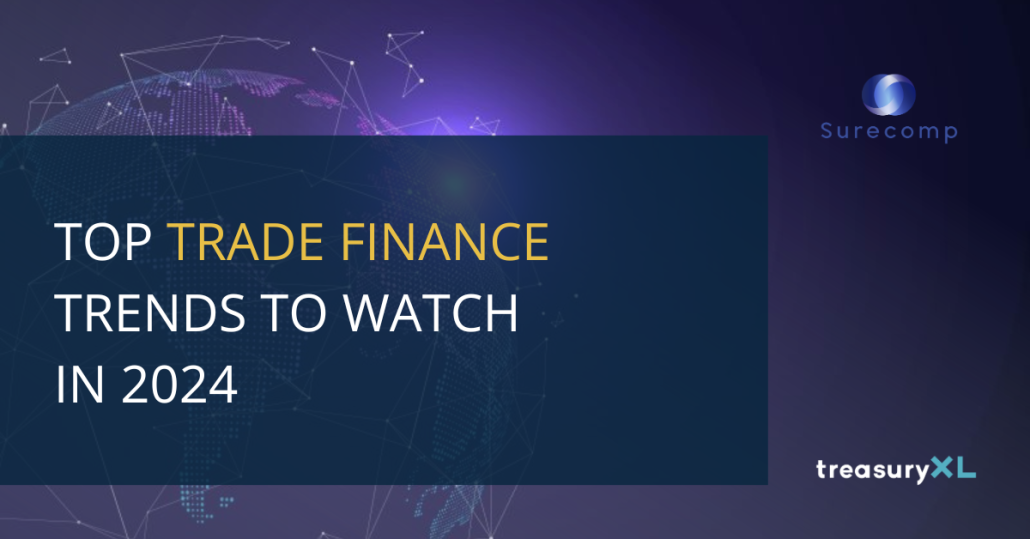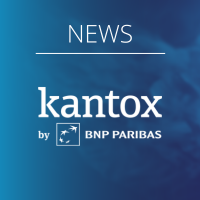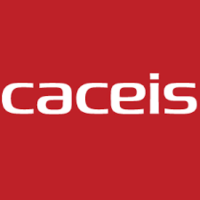Top trade finance trends to watch in 2024
By Surecomp
Trade finance is a critical component of global commerce, facilitating the movement of goods and services across borders. As we approach 2024, we believe several emerging trends are poised to reshape the landscape of trade finance, driving efficiency, sustainability, and resilience in international trade. These top trade finance trends for 2024 are expected to redefine the way businesses conduct cross-border transactions and navigate the complexities of the global marketplace.

Digitization: API standards and AI
Following an increased spotlight on technology during the pandemic, the passing of the Electronic Trade Documents Act (ETDA) in September this year marked another key milestone in the advancement of digital trade. The use of trade finance technology is again accelerating as more and more companies shift to digital document exchange and expect their banks to respond with speed. The key to real-time response rates and streamlined process efficiency is an Application Programming Interface (API)-based open platform, which allows all parties to connect, check, communicate and collaborate. It also allows fintech interoperability which is key to bringing the ecosystem together for extended data insights, informed decision-making and risk mitigation. We expect 2024 will see an increased use of APIs as standards are put in place and technology providers expand their portfolios. In collaboration with the International Chamber of Commerce (ICC), SWIFT has just released the first API standard for bank guarantees. This means for example, that Surecomp’s banking customers will be able to connect via its RIVO™ hub to any third-party compliance solution and have all their transactions compliance checked regardless of whether they reside in Surecomp’s proprietary DOKA™ or IMEX™ solutions, or an external back-office solution.
The adoption of artificial intelligence (AI) and machine learning algorithms will further empower trade finance institutions to automate complex processes, conduct robust risk assessments, and offer more personalized financial solutions to businesses. Optical character recognition (OCR) standards for enhancing accuracy, AI-driven credit scoring models and predictive analytics tools will enable financial institutions to make informed decisions, improve underwriting and streamline the credit approval process, ultimately fostering greater financial inclusion and access to trade finance for small and medium-sized enterprises (SMEs) and those in emerging and underserved markets. A combination of innovative fintech hubs like RIVO™ and alternative financing models will enable businesses in developing economies to access affordable trade finance solutions, helping to bridge the trade finance gap, and allowing them participate more actively in global trade, thereby fostering inclusive economic growth and development.
Regulatory compliance and risk management
Increasing regulatory scrutiny, geopolitical volatility and the proliferation of digital trade finance will necessitate the implementation of robust cybersecurity measures to mitigate loss and safeguard sensitive data. Trade finance institutions will prioritize robust due diligence and compliance using encryption protocols, biometric authentication and real-time monitoring systems to fortify their digital infrastructure and protect against potential attacks and data breaches. With an ongoing rise in trade-based fraud, there will be a focus on prevention, with solutions used to detect duplicate invoice financing and other falsified trade documents. Access to advanced regulatory technologies and sanction screening solutions will ensure adherence to international trade regulations, minimize compliance risk, and safeguard institutions against potential penalties and reputational damage.
Growth in sustainable trade finance
Sustainable trade finance practices will gain traction next year as businesses prioritize environmental, social, and governance (ESG) considerations in their trade activities. Financial institutions and corporations will increasingly incorporate sustainability-linked loan structures, green bonds, and ESG-linked trade finance solutions to support environmentally friendly supply chains and promote responsible business practices globally. The ICC Sustainable Trade Finance Definitions and Standards (STFD) pilot is already in progress, focusing on a second phase framework outlining four trade components to be assessed for their environmental and socio-economic sustainability. Surecomp’s RIVO™ solution is already fully equipped to monitor transaction-level ESG scoring, so customers can actively manage their trade related ESG profile and monitor the environmental and social impact of their business.
Supply chain finance expansion
With a growing emphasis in times of uncertainty on supply chain resilience and risk management, there will be an increased need for companies to optimize their working capital. As a result, supply chain finance (SCF) solutions will witness significant expansion. Leveraging advanced data analytics and AI to mitigate supply chain disruptions, and enhance collaboration between buyers and suppliers, users will be able to strengthen the overall resilience of their global supply chains. This will give rise to an increased use of open account and receivables financing programs, so banks already using digital SCF solutions will be better equipped to serve their corporate customers. From the corporate perspective, having access to multiple banking partners to secure finance and gain control of liquidity on one centralized platform will be favoured.
In summary
As the global trade finance landscape continues to rapidly evolve, these key trends emphasize the importance of digital innovation, sustainability and regulatory compliance in shaping the future of international trade. By embracing these transformative trends, trade finance institutions and businesses can adapt to the changing dynamics of the global marketplace, foster greater resilience, and unlock new opportunities for growth and collaboration in the years ahead.
Blog by Tal Weiser, Chief Revenue Office, Surecomp
Can’t get enough? Check out these latest items
 https://treasuryxl.com/wp-content/uploads/2026/02/Nomentia-BLOGS-featured.png
200
200
treasuryXL
https://treasuryxl.com/wp-content/uploads/2018/07/treasuryXL-logo-300x56.png
treasuryXL2026-02-24 07:00:562026-02-23 16:40:30Nomentia Treasury Trends Report 2026
https://treasuryxl.com/wp-content/uploads/2026/02/Nomentia-BLOGS-featured.png
200
200
treasuryXL
https://treasuryxl.com/wp-content/uploads/2018/07/treasuryXL-logo-300x56.png
treasuryXL2026-02-24 07:00:562026-02-23 16:40:30Nomentia Treasury Trends Report 2026 https://treasuryxl.com/wp-content/uploads/2026/02/Kantox-BLOGS-featured-1.png
200
200
treasuryXL
https://treasuryxl.com/wp-content/uploads/2018/07/treasuryXL-logo-300x56.png
treasuryXL2026-02-23 16:01:512026-02-23 16:05:49Kantox appoints Mathieu Lacour as its new Chief Executive Officer
https://treasuryxl.com/wp-content/uploads/2026/02/Kantox-BLOGS-featured-1.png
200
200
treasuryXL
https://treasuryxl.com/wp-content/uploads/2018/07/treasuryXL-logo-300x56.png
treasuryXL2026-02-23 16:01:512026-02-23 16:05:49Kantox appoints Mathieu Lacour as its new Chief Executive Officer https://treasuryxl.com/wp-content/uploads/2025/11/FinanceKey-Featured.png
200
200
treasuryXL
https://treasuryxl.com/wp-content/uploads/2018/07/treasuryXL-logo-300x56.png
treasuryXL2026-02-23 07:00:402026-02-23 10:24:50Real-time treasury data in Excel
https://treasuryxl.com/wp-content/uploads/2025/11/FinanceKey-Featured.png
200
200
treasuryXL
https://treasuryxl.com/wp-content/uploads/2018/07/treasuryXL-logo-300x56.png
treasuryXL2026-02-23 07:00:402026-02-23 10:24:50Real-time treasury data in Excel https://treasuryxl.com/wp-content/uploads/2024/01/Template_VACANCY-featured.png
200
200
treasuryXL
https://treasuryxl.com/wp-content/uploads/2018/07/treasuryXL-logo-300x56.png
treasuryXL2026-02-20 07:00:192026-02-19 13:09:43Vacancy Treasury Consultant – Brussels
https://treasuryxl.com/wp-content/uploads/2024/01/Template_VACANCY-featured.png
200
200
treasuryXL
https://treasuryxl.com/wp-content/uploads/2018/07/treasuryXL-logo-300x56.png
treasuryXL2026-02-20 07:00:192026-02-19 13:09:43Vacancy Treasury Consultant – Brussels https://treasuryxl.com/wp-content/uploads/2026/02/caceis-logo-200x200-2.png
200
200
treasuryXL
https://treasuryxl.com/wp-content/uploads/2018/07/treasuryXL-logo-300x56.png
treasuryXL2026-02-19 11:20:292026-02-19 11:30:38STAGE – OTC Derivatives Collateral Officer H/F @ CACEIS
https://treasuryxl.com/wp-content/uploads/2026/02/caceis-logo-200x200-2.png
200
200
treasuryXL
https://treasuryxl.com/wp-content/uploads/2018/07/treasuryXL-logo-300x56.png
treasuryXL2026-02-19 11:20:292026-02-19 11:30:38STAGE – OTC Derivatives Collateral Officer H/F @ CACEIS https://treasuryxl.com/wp-content/uploads/2017/10/Adidas.png
200
200
treasuryXL
https://treasuryxl.com/wp-content/uploads/2018/07/treasuryXL-logo-300x56.png
treasuryXL2026-02-19 11:12:362026-02-19 11:23:14INTERNSHIP – FINANCE, TREASURY or AUDIT @ adidas
https://treasuryxl.com/wp-content/uploads/2017/10/Adidas.png
200
200
treasuryXL
https://treasuryxl.com/wp-content/uploads/2018/07/treasuryXL-logo-300x56.png
treasuryXL2026-02-19 11:12:362026-02-19 11:23:14INTERNSHIP – FINANCE, TREASURY or AUDIT @ adidas https://treasuryxl.com/wp-content/uploads/2026/02/Lufthansa-Logo-200x200-1.png
200
200
treasuryXL
https://treasuryxl.com/wp-content/uploads/2018/07/treasuryXL-logo-300x56.png
treasuryXL2026-02-19 10:54:222026-02-19 11:25:05Internship Treasury Operations @ Lufthansa
https://treasuryxl.com/wp-content/uploads/2026/02/Lufthansa-Logo-200x200-1.png
200
200
treasuryXL
https://treasuryxl.com/wp-content/uploads/2018/07/treasuryXL-logo-300x56.png
treasuryXL2026-02-19 10:54:222026-02-19 11:25:05Internship Treasury Operations @ Lufthansa https://treasuryxl.com/wp-content/uploads/2025/06/Medline.png
200
200
treasuryXL
https://treasuryxl.com/wp-content/uploads/2018/07/treasuryXL-logo-300x56.png
treasuryXL2026-02-19 10:42:432026-02-19 10:55:15Treasury and Finance Intern @ Medline Europe
https://treasuryxl.com/wp-content/uploads/2025/06/Medline.png
200
200
treasuryXL
https://treasuryxl.com/wp-content/uploads/2018/07/treasuryXL-logo-300x56.png
treasuryXL2026-02-19 10:42:432026-02-19 10:55:15Treasury and Finance Intern @ Medline Europe https://treasuryxl.com/wp-content/uploads/2024/08/Aviva-BLOGS-featured-2.png
200
200
treasuryXL
https://treasuryxl.com/wp-content/uploads/2018/07/treasuryXL-logo-300x56.png
treasuryXL2026-02-19 07:00:482026-02-18 16:04:11Benchmarking cash, part two
https://treasuryxl.com/wp-content/uploads/2024/08/Aviva-BLOGS-featured-2.png
200
200
treasuryXL
https://treasuryxl.com/wp-content/uploads/2018/07/treasuryXL-logo-300x56.png
treasuryXL2026-02-19 07:00:482026-02-18 16:04:11Benchmarking cash, part two



